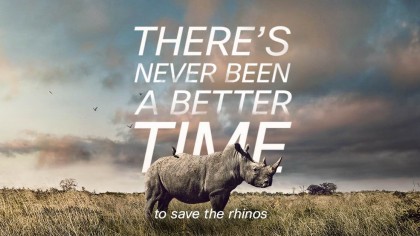World Wide Wildlife: how tech is being used to save our animals

There are around 2 million named species of animals right now, and between 30% to 50% of them could face extinction this century alone. According to WWF, the planet has already lost half of its wildlife over the past 40 years; between 200 and 2,000 extinctions occur every year.
Those numbers are scary, and many of the causes behind them are human-made. Decades of big industry has seen poisonous gasses emitted into the skies, resulting in global climate change, as humans continue to destroy more and more greenland to accommodate the world's growing population.
There are many other causes too, such as poachers killing animals to sell body parts for cash. The list goes on.
As bleak as all that sounds, there are also many humans trying to correct course. In fact, corporations, technologists and animal experts are already using innovative technologies to save endangered species in many different, unthinkable ways. From IoT to wearables, tech is giving endangered animals a new lease of life.
Drones vs poachers
Cisco and Dimension Data are just two of many tech players involved in projects that use technological innovation to improve the prospects of endangered animals. One of their joint projects is a connected tech trial aimed at regenerating the ailing rhino population.
In 1980, there were only 10,000-15,000 living Black Rhinos. Despite concerns being raised at the time, they would continue to decline, with only 2,475 recorded in 1993.
If this doesn't change, rhino deaths could overtake rhino births by 2018, according to the South African Department of Environmental Affairs. The main reason for the decline is, sadly, poachers who hunt and kill rhinos for their prized horns, which can be sold on the black market for millions.
Sign up for breaking news, reviews, opinion, top tech deals, and more.

Cisco and Dimension Data joined forces in April to use internet-connected technology as a way to stop poachers in their tracks.
In an unnamed South African game home to a herd of rhinos, they have deployed a high-tech network connecting devices like reserve-patrolling drones, thermal cameras and motion sensors to monitor and track people as they enter and leave the park.
This is in a bid to stop individuals and groups from entering illegally, be it by cutting down fences or entering through gates.
Dubbed 'Connected Conversation', the project is still in the early days. The companies have created a so-called reserve area network (RAN) and installed Wi-Fi hotspots around key areas of the park, which allow all the different technologies to collect information and communicate with each other.
Specialists based on-site control the network and all its technology, and also utilise the cloud for data analytics and back-up. The idea is that poachers are detected and apprehended before they can cause harm to the rhinos.
Another great aspect of using this tech is that rhinos aren't harmed in the process. It doesn't, say, involve darting the animals to insert sensors into their horns or under their skin, unlike some other initiatives. Cisco and Dimension say the tech will be replicated in other reserves across the world in the foreseeable future, following the trial phase - which will run till the end of the year.
"Our Connected Conservation is the only end-to-end technology solution to proactively intervene stop people entering the reserve illegally - whether it's cutting fences, being dropped onto the ground by helicopters, or simply driving in through the entrance gates," says Bruce Watson, an executive at Dimension Data.
"And the beauty of solution is that we don't touch the animals by darting them with tranquilizers to insert sensors into their horns, or inserting a chip under their skin, which can be extremely stressful and risky for the animal."
Chris Dedicoat, executive vice president of worldwide sales for Cisco, says his company and Dimension have moved quickly to find and implement a technological solution capable of protecting the world's rhino population.
He says: "South Africa is currently home to about 70% of the remaining rhinos in the world. The Cisco and Dimension Data teams moved rapidly to study and build a highly secure digital solution that provides valuable insights, transparency and visibility to those who are protecting the rhinos need to make effective and informed decisions against poaching."
Nicholas Fearn is a freelance technology journalist and copywriter from the Welsh valleys. His work has appeared in publications such as the FT, the Independent, the Daily Telegraph, The Next Web, T3, Android Central, Computer Weekly, and many others. He also happens to be a diehard Mariah Carey fan!